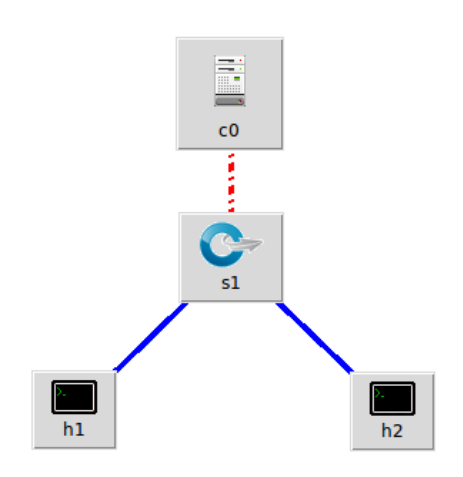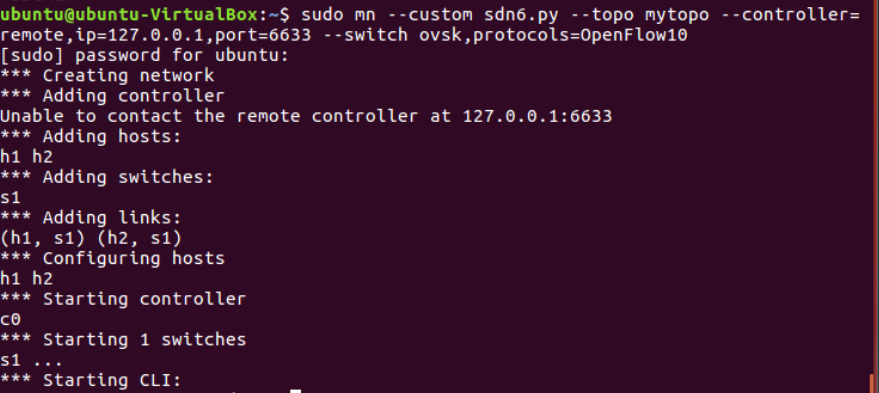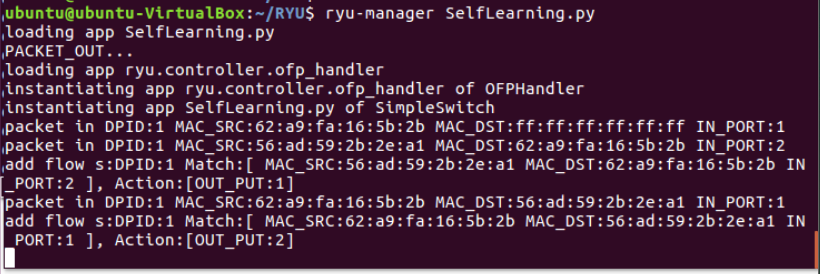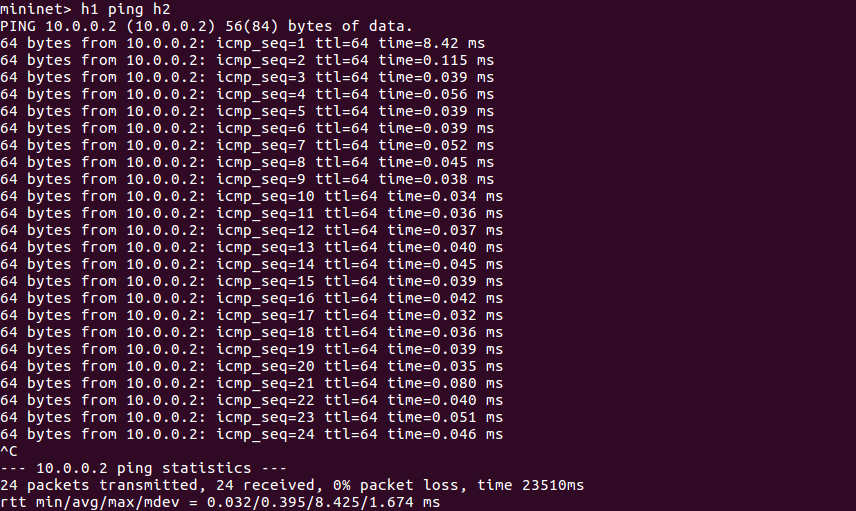1.浏览RYU官网学习RYU控制器的安装和RYU开发入门教程,提交对于教程代码的理解:
-
描述官方教程实现了一个什么样的交换机功能?
官方教程实现了一个将接收到的数据包发送到所有端口的交换机功能 -
控制器设定交换机支持什么版本的OpenFlow?
控制器设定交换机支持OpenFlow 1.0 -
控制器设定了交换机如何处理数据包?
首先通过以下这个语句设置想要向交换机协商的OpenFlow版本号
OFP_VERSIONS = [ofproto_v1_0.OFP_VERSION]给出官方的代码,这一部分是实现将接收到的数据包发送到所有端口的功能。
@set_ev_cls(ofp_event.EventOFPPacketIn, MAIN_DISPATCHER) def packet_in_handler(self, ev): msg = ev.msg dp = msg.datapath ofp = dp.ofproto ofp_parser = dp.ofproto_parser actions = [ofp_parser.OFPActionOutput(ofp.OFPP_FLOOD)] out = ofp_parser.OFPPacketOut( datapath=dp, buffer_id=msg.buffer_id, in_port=msg.in_port, actions=actions) dp.send_msg(out)- packet_in_handler(self, ev) 这个是新方法, 表明当Ryu收到OpenFlow packet_in消息时,将产生事件(调用“packet_in_handler”方法)
- set_ev_cls:是个修饰器,它功能就是告诉Ryu啥时候调用它要修饰的那个函数。
- ev.msg是表示packet_in数据结构的对象。msg.dp是代表数据路径(开关)的对象。
- dp.ofproto和dp.ofproto_parser是代表Ryu和交换机协商的OpenFlow协议的对象。
- OFPActionOutput类与packet_out消息一起使用,以指定要从中发送数据包的交换机端口。 用它来选择要往哪个交换机端口发送 。
- OFPPacketOut类用于构建packet_out消息。
如果使用OpenFlow消息类对象调用Datapath类的send_msg方法,则Ryu会生成联机数据格式并将其发送到交换机。 - send_msg() :它的作用就是让Ryu建立在线数据格式结构并发送给交换机。
2.根据官方教程和提供的示例代码(SimpleSwitch.py),将具有自学习功能的交换机代码(SelfLearning.py)补充完整
from ryu.base import app_manager
from ryu.controller import ofp_event
from ryu.controller.handler import MAIN_DISPATCHER
from ryu.controller.handler import set_ev_cls
from ryu.ofproto import ofproto_v1_0
from ryu.lib.mac import haddr_to_bin
from ryu.lib.packet import packet
from ryu.lib.packet import ethernet
from ryu.lib.packet import ether_types
class SimpleSwitch(app_manager.RyuApp):
# TODO define OpenFlow 1.0 version for the switch
OFP_VERSIONS = [ofproto_v1_0.OFP_VERSION]
def __init__(self, *args, **kwargs):
super(SimpleSwitch, self).__init__(*args, **kwargs)
self.mac_to_port = {}
def add_flow(self, datapath, in_port, dst, src, actions):
ofproto = datapath.ofproto
match = datapath.ofproto_parser.OFPMatch(
in_port=in_port,
dl_dst=haddr_to_bin(dst), dl_src=haddr_to_bin(src))
mod = datapath.ofproto_parser.OFPFlowMod(
datapath=datapath, match=match, cookie=0,
command=ofproto.OFPFC_ADD, idle_timeout=0, hard_timeout=0,
priority=ofproto.OFP_DEFAULT_PRIORITY,
flags=ofproto.OFPFF_SEND_FLOW_REM, actions=actions)
# TODO send modified message out
datapath.send_msg(mod)
@set_ev_cls(ofp_event.EventOFPPacketIn, MAIN_DISPATCHER)
def _packet_in_handler(self, ev):
msg = ev.msg
datapath = msg.datapath
ofproto = datapath.ofproto
pkt = packet.Packet(msg.data)
eth = pkt.get_protocol(ethernet.ethernet)
if eth.ethertype == ether_types.ETH_TYPE_LLDP:
# ignore lldp packet
return
if eth.ethertype == ether_types.ETH_TYPE_IPV6:
# ignore ipv6 packet
return
dst = eth.dst
src = eth.src
dpid = datapath.id
self.mac_to_port.setdefault(dpid, {})
self.logger.info("packet in DPID:%s MAC_SRC:%s MAC_DST:%s IN_PORT:%s", dpid, src, dst, msg.in_port)
# learn a mac address to avoid FLOOD next time.
self.mac_to_port[dpid][src] = msg.in_port
if dst in self.mac_to_port[dpid]:
out_port = self.mac_to_port[dpid][dst]
else:
out_port = ofproto.OFPP_FLOOD
# TODO define the action for output
actions = [datapath.ofproto_parser.OFPActionOutput(out_port)]
# install a flow to avoid packet_in next time
if out_port != ofproto.OFPP_FLOOD:
self.logger.info("add flow s:DPID:%s Match:[ MAC_SRC:%s MAC_DST:%s IN_PORT:%s ], Action:[OUT_PUT:%s] ",
dpid, src, dst, msg.in_port, out_port)
self.add_flow(datapath, msg.in_port, dst, src, actions)
data = None
if msg.buffer_id == ofproto.OFP_NO_BUFFER:
data = msg.data
# TODO define the OpenFlow Packet Out
out = datapath.ofproto_parser.OFPPacketOut(datapath=datapath, buffer_id=msg.buffer_id, in_port=msg.in_port,
actions=actions, data=data)
datapath.send_msg(out)
print("PACKET_OUT...")
3.在mininet创建一个最简拓扑,并连接RYU控制器

使用Python脚本创建拓扑
from mininet.topo import Topo
class MyTopo(Topo):
def __init__(self):
# initilaize topology
Topo.__init__(self)
# add hosts and switches
h1 = self.addHost('h1')
h2 = self.addHost('h2')
s1 = self.addSwitch('s1')
# add links
self.addLink(h1, s1, 1, 1)
self.addLink(h2, s1, 1, 2)
topos = {'mytopo': (lambda: MyTopo())}

4.验证自学习交换机的功能,提交分析过程和验证结果
未连接时查看流表

连接RYU控制器
另外开一个终端,运行命令
ryu-manager SelfLearning.py

h1 ping h2

再次查看流表
sudo ovs-ofctl dump-flows s1

5.实验体会
这次实验感觉还行,就是安装过程搞得我心态爆炸,实验十分钟,安装三小时/(ㄒoㄒ)/~~。先是网络不行了,接着又是莫名其妙的错误,所幸在助教帮助下解决了问题。
不过好在后面的具体操作部分比较简单,参考了老师发的实例之后,完整的较为顺利,就是中间python文件缩进的问题又卡了很久,后续还要继续琢磨理解。